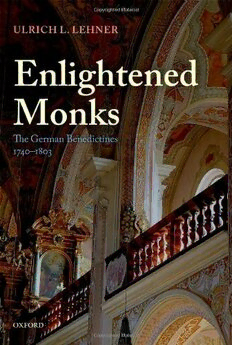
Enlightened Monks: The German Benedictines, 1740-1803 PDF
275 Pages·2011·1.395 MB·English
Most books are stored in the elastic cloud where traffic is expensive. For this reason, we have a limit on daily download.
Preview Enlightened Monks: The German Benedictines, 1740-1803
Description:
Enlightened Monks investigates the social, cultural, philosophical, and theological challenges the German Benedictines had to face between 1740 and 1803, and how the Enlightenment process influenced the self-understanding and lifestyle of these religious communities. It had an impact on their forms of communication, their transfer of knowledge, their relationships to worldly authorities and to the academic world, and also their theology and philosophy. The multifaceted achievements of enlightened monks, which included a strong belief in individual freedom, tolerance, human rights, and non-violence, show that monasticism was on the way to becoming fully integrated into the Enlightenment. Ulrich L. Lehner refutes the widespread assumption that monks were reactionary enemies of Enlightenment ideas. On the contrary, he demonstrates that many Benedictines implemented the new ideas of the time into their own systems of thought. This revisionist account contributes to a better understanding not only of monastic culture in Central Europe, but also of Catholic religious culture in general.
See more
The list of books you might like
Most books are stored in the elastic cloud where traffic is expensive. For this reason, we have a limit on daily download.
